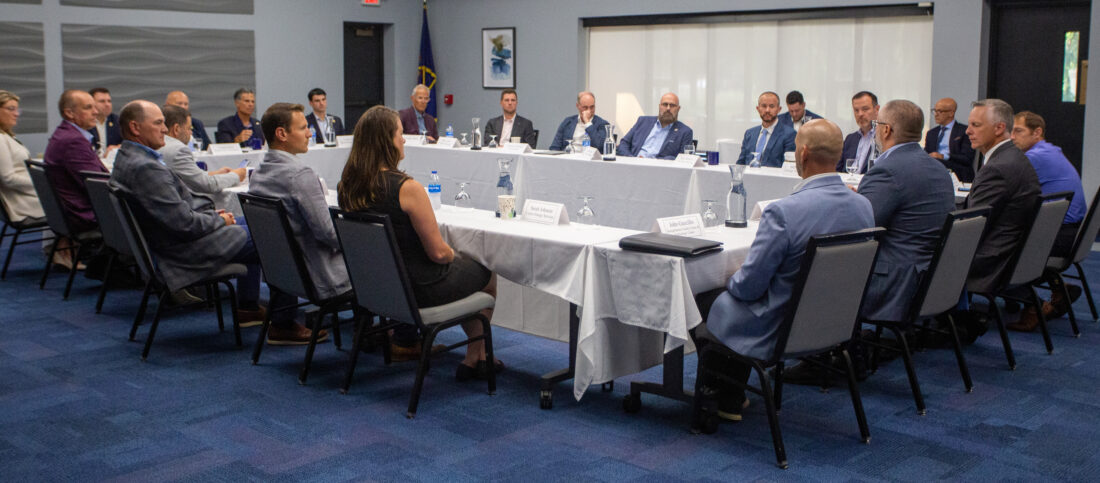‘Incredible opportunity’: Congressmen, industry leaders discuss energy

KAREN VIBERT-KENNEDY/Sun-Gazette Members of Congress, federal officials and industry leaders take part in a rural opportunity roundtable at Penn College on Wednesday.
A federal lawmaker serving Williamsport viewed a high-level roundtable discussion this week on energy, manufacturing and expanding opportunity in Pennsylvania’s rural communities as a step to chart a path forward for regional growth.
The two-and-a-half hour roundtable, held at the Pennsylvania College of Technology’s Thompson Professional Development Center, was co-sponsored by the Pennsylvania Chamber of Business and Industry, Pennsylvania College of Technology and Williamsport/Lycoming Chamber of Commerce.
The event marked a continued effort by U.S. Rep. Dan Meuser, R-Dallas, and his colleagues to bring federal policymakers into direct conversation with those creating jobs, training the next generation, and building energy capacity across Pennsylvania.
The discussion — on a round table — served as a platform to discuss how federal policy can better align with regional success models – focusing on workforce development, energy infrastructure, and advanced manufacturing. It was introduced by state Rep. Jamie Flick, R-South Williamsport, a college alum. Flick is among the House members working on projects mentioned at the conference along with future economic development in the region in Union and Lycoming counties in the 83rd House district.
“This roundtable underscored the incredible opportunity we have to grow Pennsylvania’s energy economy, support small businesses, and invest in workforce development programs that deliver results,” Meuser said.
“We heard directly from job creators, educators, and innovators who are driving progress in our region,” he said. “Whether it’s strengthening technical education pipelines, modernizing permitting to meet 21st-century demands, or scaling homegrown energy solutions, the discussion was about action — focused, practical, and rooted in what’s working right here in Pennsylvania.”
Meuser added, “Pennsylvania has the resources, the talent, and the entrepreneurial spirit to lead the next chapter of America’s energy and manufacturing renaissance. From the classroom to the jobsite to the boardroom, our Commonwealth is positioned to lead. Today’s dialogue is part of ensuring that federal policy helps — rather than hinders — that momentum by reinforcing local strengths, removing bureaucratic barriers, and supporting the industries that power our economy.”
The conversation focused on several priorities that will be essential to sustaining Pennsylvania’s competitive edge.
These included expanding federal support for career and technical education through corporate tax credit models inspired by Pennsylvania’s EITC program; modernizing infrastructure and permitting processes to attract data centers and meet surging energy demands driven by AI and manufacturing reshoring; unlocking critical mineral recovery from produced water through targeted tax incentives and streamlined federal regulation; and strengthening coordination between federal, state, and local partners to scale successful workforce pipelines and rural economic development strategies.
Prior to the roundtable, Meuser toured the college campus to see firsthand how the institution is “Inspiring and Preparing Tomorrow Makers” with a world-class, hands-on education.
He met with college President Dr. Michael J. Reed and Dr. Bradley Webb, Dean of Engineering Technologies, to discuss how Penn College blends real-world experience, innovation, and strong industry partnerships to prepare students for the jobs of tomorrow. Meuser emphasized the importance of supporting institutions like Penn College that are building a more skilled and resilient workforce in Pennsylvania.
Training, education and initiatives provided by the partners of Williamsport/Lycoming Chamber of Commerce are resulting in economic successes for this region.
Jason Fink, president and CEO of the chamber, discussed the recent expansion and increase in jobs at Prysmian Group, which is making aluminum cable for the Midwest Grain Belt Express electricity grid.
He also discussed how AA Metal Specialities bought Chance Aluminum and restarted the plant and has purchased about 200 acres of industrial land where it plans to open in either late 2026 or early 2027, expecting to employ 350 to 400 people.
Fink related success for West Pharmaceuticals at the Williamsport and Jersey Shore facilities, where the city facility is planning to hire hundreds of people, and he touched on the recent announcement by Verne Inc. to — in nine months — open a production Muncy area plant that will build storage tanks that store compressed hydrogen for use in tanks for over-the-road trucks. The plant will employ 61 people. Moreover, the Verne plant will network with businesses such as PMF Inc. which designs the storage containers that store hydrogen gas.
Fink observed the grand opening of Chick-fil-A on Maynard Street and the expected opening of the Bass Pro in Muncy Township in 2027.
Larry Allison Jr., owner of Allison Crane & Rigging, discussed his business relationship to oil and gas fields, moving heavy machines and establishing a presence here and in western Texas.
He also said he branched out by purchasing a 100-year-old commercial bakery and the former Country Store Brand Meats. He said his wife oversees a third business.
“We’d love to see our employees paid more,” he said, looking forward to the no-tax on overtime policy, which he said would give the employees a couple more dollars in their paychecks when they perform overtime for the businesses.
He said he also was pleased to see the national interest rates going down, and a drive to deploy more capital investments but he cautioned those at the table to “keep the pressure on.”
In terms of controlling business expenses, he was not positive, asking why a trailer cost $30,000 and is now $50,000 for the same product.
Additionally, he said, a tractor trailer runs an average of $100,000 on up. “Why?” he asked.
More pressure for the businesses include rising health insurance and general liability, he said.
While there have been positive trends, such as the price of eggs dropping, other groceries are not, Allison observed.
“How do we keep absorbing this?” he asked the panel.
Allison said he was in attendance at the recent Energy Summit in Pittsburgh, where $92 billion of energy sector projects were announced. He listened to speakers, including Mike Rowe, the television celebrity and narrator for the show Dirty Jobs, who promotes and advocates for students learning trades.
He said Rowe “stole the entire show,” while asking those at the summit where the next group of skilled workers was going to come from, and then answering, “eighth grade.”
He suggested displaying career information at the school districts and showing the students the average amount of income they could earn in various career fields — including jobs that begin at $30 to $40 per hour on up.
“Overall, the roundtable featured three major focus areas:
Workforce development
Panelists from Penn College, the Susquehanna County Career & Technology Center, and Coterra highlighted how regional models are effectively preparing students for high-skill, high-demand energy and technical careers. Participants explored ways the federal government can replicate Pennsylvania’s Education Improvement Tax Credit (EITC) program at the national level — leveraging private-sector investment to expand career and technical education.
Manufacturing and technology infrastructure
Industry innovators emphasized the urgency of upgrading permitting systems and expanding access to reliable energy infrastructure. As energy demand surges — especially with the rise of AI and data centers — speakers stressed the need for regulatory certainty and policies that support domestic production, including new investments in power transmission, siting reforms, and localized supply chains.
Energy services and small business growth
Representatives from Repsol, Seneca Resources, Costy’s Energy, and others shared real-world perspectives on operating in Pennsylvania’s natural gas fields.
Discussions focused on opportunities to extract rare earth elements from brine water, lower emissions, and grow small service companies. Participants also emphasized the importance of stable tax policy, streamlined oversight, and federal support for community investment and workforce partnerships.



